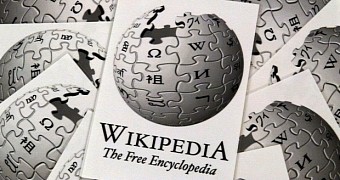Wikipedia might be the go-to fountain of wisdom for thousands of strongly caffeinated students racing to finish an assignment before their teacher figures out they don't really have a dog with an appetite for scholarly articles, but this does not make it reliable.
Not by a long shot and especially not when it comes to controversial scientific topics, a team of researchers argue in a study published in today's issue of the journal PLOS ONE. Quite the contrary, information sabotage can happen.
Certain entries are edited intriguingly often
What with Wikipedia being the world's most popular online encyclopedia and one of the most visited websites in the US, University of Connecticut researcher Gene E. Likens and his colleagues thought it worthwhile to try and figure out just how reliable it really is.
As part of their work, the team looked at the edit histories of several entries on politically controversial science topics and non-controversial science topics. The controversial issues: acid rain, evolution, and global warming. The non-controversial ones: the standard model in physics, heliocentrism, general relativity, and continental drift.
The researchers focused on aspects like the mean number of words added, deleted or edited. They also took into consideration the mean number of page views per day for each of the controversial or non-controversial science topics they included in their study.
The team found that, as a rule, Wikipedia entries concerning politically controversial science topics are edited more heavily. Interestingly, they are also viewed more often than entries on non-controversial matters, they explain in the report detailing their work.
“Wikipedia's global warming entry sees 2-3 edits a day, with more than 100 words altered, while the standard model in physics has around 10 words changed every few weeks,” said Gene L. Likens in an interview, as cited by PhyOrg.
“On entries subject to edit-wars, like acid rain, evolution, and global change, one can obtain - within seconds - diametrically different information on the same topic. Wikipedia's acid rain entry receives near-daily edits, some of which result in egregious errors and a distortion of consensus science.”
So, what's there to do?
While browsing through articles, the research team also found that, although some entries are vulnerable to information sabotage and therefore unreliable, the fact remains that, as of recently, the encyclopedia has started to include more scientific content based on actual scientific journals. Plainly put, Wikipedia is moving in the right direction. It's just taking it some time to get there.
Meanwhile, Gene L. Likens and his colleagues recommend that people who visit the website looking to brush up on their knowledge of one topic or another exercise caution and keep in mind that the entries on controversial issues might not be in accordance with the actual facts.

 14 DAY TRIAL //
14 DAY TRIAL //